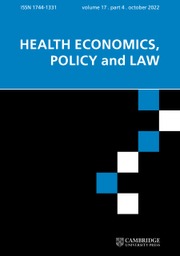Article contents
Some pain, no gain: experiences with the no-claim rebate in the Dutch health care system
Published online by Cambridge University Press: 01 October 2009
Abstract
To contain expenditures in an increasingly demand driven health care system, in 2005 a no-claim rebate was introduced in the Dutch health insurance system. Since demand-side cost sharing is a very controversial issue, the no-claim rebate was launched as a consumer friendly bonus system to reward prudent utilization of health services. Internationally, the introduction of a mandatory no-claim rebate in a social health insurance scheme is unprecedented. Consumers were entitled to an annual rebate of ₠ 255 if no claims were made. During the year, all health care expenses except for GP visits and maternity care were deducted from the rebate until the rebate became zero. In this article, we discuss the rationale of the no-claim rebate and the available evidence of its effect. Using a questionnaire in a convenience sample, we examined people’s knowledge, attitudes, and sensitivity to the incentive scheme. We find that only 4% of respondents stated that they would reduce consumption because of the no-claim rebate. Respondents also indicated that they were willing to accept a high loss of rebate in order to use a medical treatment. However, during the last month of the year many respondents seemed willing to postpone consumption until the next year in order to keep the rebate of the current year intact. A small majority of respondents considered the no-claim rebate to be unfair. Finally, we briefly discuss why in 2008 the no-claim rebate was replaced by a mandatory deductible.
- Type
- Articles
- Information
- Copyright
- Copyright © Cambridge University Press 2009
References
- 8
- Cited by


